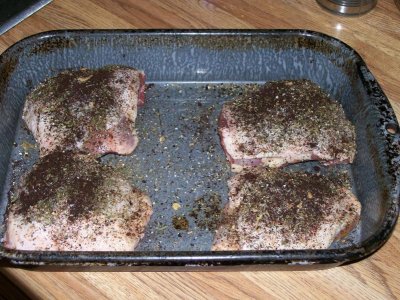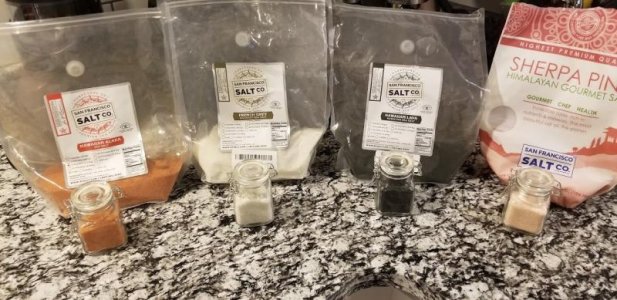Monkey Uncle
is one Smokin' Farker
- Joined
- Oct 26, 2014
- Location
- Somewher...
OK, maybe that thread title is a little bombastic...
Yesterday several of us had a lively discussion about whether it makes a difference if you season your meat with a high-grade sea salt, Himalayan salt, etc., vs. just using plain old kosher or table salt (https://www.bbq-brethren.com/forum/showthread.php?t=263984). I was firmly in the camp that it doesn't make a difference, but others were just as strong in their opinions that it does make a difference. There's only one way to settle this...a taste test. :icon_smile_tongue:
So today I cooked some chicken thighs and did a taste test comparing sea salt to kosher salt. Specifically, I compared my old stand-by, Morton kosher salt, to Hain sea salt.
O.K., stop laughing. I realize that Hain is the grande el cheapo of cheap sea salts. But it is made from evaporated sea water, so it should contain any trace minerals that were present in the water, which is the main selling point for sea salts. And it is supposed to be all natural. Most importantly, it's what I had on hand. Both the Hain sea salt and the Morton kosher salt contain an anti-caking additive, although they don't use the same additive. Neither salt is iodized, and neither manufacturer discloses any other additives.
All seasoning was applied by eye, i.e. no measuring, with each seasoning component sprinkled on one at a time (this is my usual method for seasoning meat for quick grilling). Aside from the salt, all thighs were also seasoned with fresh ground black pepper, ramp powder, and smoked ancho powder. Seasoning was applied about an hour before the thighs went on the grill. I usually like to season a few hours before, but time got away from me today. I grilled the thighs over medium high heat on the old gasser for about an hour.
My wife and I constituted the test subjects. I tried to make the test as blind as possible. My wife didn't know what the test was about; I just asked her to compare two chicken thighs. Of course I knew the subject of the test, but I had my wife feed me pieces from each of the two thighs while I had my eyes closed so I couldn't tell which one I was tasting.
So the results? I couldn't taste any difference, but my wife said the sea salt thigh had more flavor and was more tender. When I asked her to explain what she meant by more flavor, she said, "I don't know; saltier, I guess." Which makes sense, because the Hain sea salt is a smaller grain than kosher salt, so it is easy to apply more of it when you are eyeballing the application. Neither of us detected any distinctive flavor, better flavor, or worse flavor from either salt.
Based on this very rudimentary test, I'm still inclined to believe that it doesn't make much difference what salt you use on your meat. But obviously this is not a conclusive test given that (1) the sea salt was one of the cheapest ones out there, (2) there were only two tasters, and (3) one of those tasters knew the subject of the test and already had an opinion about it.
I'll be looking for more opportunities to test salts in the future, but in the meantime, I encourage you all to conduct your own salt taste tests comparing your favorite salt to plain old kosher and/or table salt, and then post the results in this thread. If you do a test, please keep the following in mind:
(1) Conduct a blind test. If the tasters know what they are tasting, the results may be biased and are not valid.
(2) Don't compare salts that have other seasonings mixed in. Of course those will taste different from plain kosher or table salt.
(3) Please be honest when you report your results!
O.K., here are a couple of pics, just because everyone loves pron. The sea salt thighs are on the left and the kosher salt thighs are on the right. See the difference? :wink:
Yesterday several of us had a lively discussion about whether it makes a difference if you season your meat with a high-grade sea salt, Himalayan salt, etc., vs. just using plain old kosher or table salt (https://www.bbq-brethren.com/forum/showthread.php?t=263984). I was firmly in the camp that it doesn't make a difference, but others were just as strong in their opinions that it does make a difference. There's only one way to settle this...a taste test. :icon_smile_tongue:
So today I cooked some chicken thighs and did a taste test comparing sea salt to kosher salt. Specifically, I compared my old stand-by, Morton kosher salt, to Hain sea salt.
O.K., stop laughing. I realize that Hain is the grande el cheapo of cheap sea salts. But it is made from evaporated sea water, so it should contain any trace minerals that were present in the water, which is the main selling point for sea salts. And it is supposed to be all natural. Most importantly, it's what I had on hand. Both the Hain sea salt and the Morton kosher salt contain an anti-caking additive, although they don't use the same additive. Neither salt is iodized, and neither manufacturer discloses any other additives.
All seasoning was applied by eye, i.e. no measuring, with each seasoning component sprinkled on one at a time (this is my usual method for seasoning meat for quick grilling). Aside from the salt, all thighs were also seasoned with fresh ground black pepper, ramp powder, and smoked ancho powder. Seasoning was applied about an hour before the thighs went on the grill. I usually like to season a few hours before, but time got away from me today. I grilled the thighs over medium high heat on the old gasser for about an hour.
My wife and I constituted the test subjects. I tried to make the test as blind as possible. My wife didn't know what the test was about; I just asked her to compare two chicken thighs. Of course I knew the subject of the test, but I had my wife feed me pieces from each of the two thighs while I had my eyes closed so I couldn't tell which one I was tasting.
So the results? I couldn't taste any difference, but my wife said the sea salt thigh had more flavor and was more tender. When I asked her to explain what she meant by more flavor, she said, "I don't know; saltier, I guess." Which makes sense, because the Hain sea salt is a smaller grain than kosher salt, so it is easy to apply more of it when you are eyeballing the application. Neither of us detected any distinctive flavor, better flavor, or worse flavor from either salt.
Based on this very rudimentary test, I'm still inclined to believe that it doesn't make much difference what salt you use on your meat. But obviously this is not a conclusive test given that (1) the sea salt was one of the cheapest ones out there, (2) there were only two tasters, and (3) one of those tasters knew the subject of the test and already had an opinion about it.
I'll be looking for more opportunities to test salts in the future, but in the meantime, I encourage you all to conduct your own salt taste tests comparing your favorite salt to plain old kosher and/or table salt, and then post the results in this thread. If you do a test, please keep the following in mind:
(1) Conduct a blind test. If the tasters know what they are tasting, the results may be biased and are not valid.
(2) Don't compare salts that have other seasonings mixed in. Of course those will taste different from plain kosher or table salt.
(3) Please be honest when you report your results!
O.K., here are a couple of pics, just because everyone loves pron. The sea salt thighs are on the left and the kosher salt thighs are on the right. See the difference? :wink:









